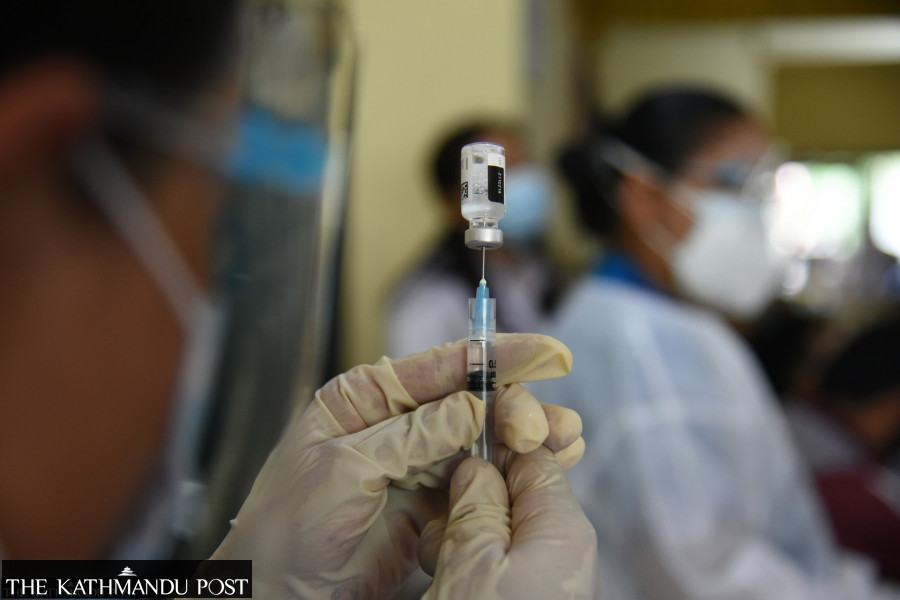Health
Antibodies from Vero Cell, Covishield jabs drop after 60 days
The study by Nepal Health Research Council calls for further study to see what happens to the antibodies after 150 days.
Prithvi Man Shrestha
The level of antibodies against Covid-19 in individuals who are fully vaccinated with Vero Cell and Covishield vaccines drops after 60 days, a study conducted by Nepal Health Research Council has found.
The study report published on Friday revealed the continued presence of antibodies for 150 days among the fully vaccinated individuals but at a reduced level. It was also found that the level of antibodies grows in the first 60 days.
The study was conducted among 1,796 people in Kathmandu Valley. As many as 81 percent of the study subjects were vaccinated and the rest were unvaccinated. Their antibody samples were taken between May 31 and July 1.
“When it comes to the vaccinated population, the conclusion of the study is that the level of antibodies decreased in case of both Covishiled and Vero Cell vaccine recipients after 60 days,” said Dr Meghnath Dhimal, chief research officer at the council. “We found that the presence of antibodies on the vaccinated population till 150 days but at a reduced level.”
According to the study, the level of antibodies dropped to 54.3 percent on average during 91-150 days from 83.4 percent. This is the average antibodies among people who were vaccinated with China-made Vero Cell and India-made Covishield, an AstraZeneca type vaccine.
The level of antibodies for Vero Cell vaccine was at 81.6 percent during 31-60 days and it dropped to 66.7 percent during 91-150 days. In the case of Covishield, the level of antibodies was at 84.7 percent during 31-60 days and it dropped to 53.9 percent during 91-150 days.
The study results match the finding of the antibody study conducted on Pfizer vaccine.
Antibodies produced by Pfizer against Covid-19 decreased more than 80 percent after six months in some elderly people, according to a study conducted on 120 nursing home residents and 92 health care workers by Case Western Reserve University and Brown University in the United States.
“As the level of antibody has been found decreased over time even among the people who had taken both doses, additional studies on those participating in the study are required,” the council said in a statement.
Dr Dhimal said the council was not sure whether antibodies will remain and if they did to what extent after 150 days.
“We are conducting a study on this aspect as well. Its findings should conclude whether the vaccines can be effective for a long-term,” he said.
Dr Jhalak Sharma Gautam, chief of management division at the Department of Health Service, said the Covid-19 vaccines appear to work against the coronavirus, as the study has concluded that antibodies continue to exist till 150 days.
“What happens after 150 days should be studied. It will help us decide whether booster doses will be required,” said Gautam.
Some developed countries are already planning to administer booster doses despite the World Health Organisation urging that all the countries around the world first need to have access to complete vaccination.
According to a New York Times report, Pfizer and BioNTech were applying to the US Food and Drug Administration for supplemental approval of a coronavirus vaccine booster shot for those aged 16 and up.
The companies conducted a study on 306 volunteers who received a booster shot about five to eight months after their second shot and found that the level of antibodies that block the coronavirus jumped more than three times the level after the second dose.
The side effects of a third injection were about the same as after the initial two doses, the companies said.
Meanwhile, Nepal Health Research Council said antibodies have developed only in half of the people aged 60 years and above who had taken the first doses of Covishield vaccine.
“There is a need for further study on the level of antibodies during 14-21 days after they [60 years and up] were given the second dose,” the council stated.
Antibodies were found in 46 percent of the surveyed people who were not vaccinated. “This suggests the spread of the coronavirus in communities,” the council said.




 11.84°C Kathmandu
11.84°C Kathmandu















